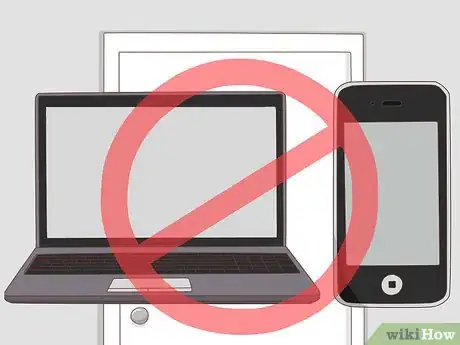This article was co-authored by Alexander Ruiz, M.Ed.. Alexander Ruiz is an Educational Consultant and the Educational Director of Link Educational Institute, a tutoring business based in Claremont, California that provides customizable educational plans, subject and test prep tutoring, and college application consulting. With over a decade and a half of experience in the education industry, Alexander coaches students to increase their self-awareness and emotional intelligence while achieving skills and the goal of achieving skills and higher education. He holds a BA in Psychology from Florida International University and an MA in Education from Georgia Southern University.
wikiHow marks an article as reader-approved once it receives enough positive feedback. In this case, 97% of readers who voted found the article helpful, earning it our reader-approved status.
This article has been viewed 68,254 times.
Do you really want good grades but are a little (or very) lazy? Do you always say how you will study weeks before that horrible test but you never actually do, so you end up cramming the night before or you even skip class? Well, then you probably need a study schedule! To excel, however, you will need to stick to it.
Steps
Creating a Study Schedule
-
1Think about your end goals. Ask yourself: Why do I want to create a study schedule? What are my grades like? Would a schedule help me? Those are very important questions that you need to ask yourself. Write them down and answer them. Put them somewhere near so you will always be reminding yourself of those D's and F's and turn them into A's and B's.
-
2Consider how much time you want to spend on studying. You don't need to spend half of your day with your head in the books. You just need to commit a set amount of time for your studies to have good grades. You can do this by:[1]
- Writing down all of your subjects that you need to study on a daily basis.
- For each subject, write how many times a week you'll study it, and how much time you'll spend on it that day. For example, if you just want to go over some stuff in your History class write 3x a week for 20 minutes. Add up all the time together and divide it by 7 (exam. 14 hours divided by 7 is 2 hours daily) and that's how much time you'll need to study per day.
Advertisement - Writing down all of your subjects that you need to study on a daily basis.
-
3Decide if that is a realistic goal. It will probably be really hard to study for 5 or 6 hours daily, so be realistic with the amount of time you choose to commit. If you know you won't do it, it will just stress you out. You may also consider getting help, like joining a small study group or getting a tutor. If you don't have a study group at your school, you can start one.
- Ask a smart kid in your math class to help you with geometry if that's what you struggle with. And if nobody wants to help you, try getting a tutor. In those cases, you will need to stick to them. The study schedule will be helpful so that you can be sure you've studied everything you need to.
-
4Make the schedule! Try to make it on thick paper so it won't just rip apart. Also, make it very appealing. Decorate it with colorful paper and cut out small shapes. Write days of the week and names of the subjects in sparkly colors and just make it perfect for you. Maybe you like it in black and white, purple and green, gold and orange - it's your choice![2]
- Try studying at the same time each day. For instance, you might set aside an hour after dinner for studying only. That way, you won't have any other priorities that are competing for your time.[3]
-
5Look at it. Are you happy with your schedule? There is still time to change the amount of study time and the look of it. Otherwise, you can start the studying!
Sticking to the Schedule
-
1Start studying. The best way to stick to start studying. If you do so, you will feel very proud, but also it can help you find out your weak points. That way, you will know to focus on them more.[4]
- Don't feel like you have to study everything all at once. When you focus on accomplishing a little each day, it's easier to stick to the task.[5]
-
2Avoid procrastinating. If you're studying for an English test, but you know that there is a new episode of The Big Bang Theory on, what will you do? Probably turn on the TV and say that you can study later, or just think to yourself that you can multitask and end up just watching the show. So choose your time wisely!
-
3Eliminate distractions. Putting your phone away is the most essential.[6] Turn it off phone and put it in another room so you don't get tempted to check Ethan's Facebook status or text Stacy and Jenna. Don't study in front of a computer or other device because it's just an unneeded temptation.
- If you need to study on the computer, make a promise to not go on YouTube, Facebook or post a Twitter status saying, "Uggghh studying!!!! :'(".
- Ask your family members to leave you alone for an amount of time, and say that you're busy if anyone calls you.
-
4Reward yourself![7] If you spent three hours a day studying for a big test, don't feel bad about making yourself a nice hot chocolate with tiny marshmallows, lying in a comfy couch, wrapped in your favorite cozy blanket watching your favorite movie. If you're a girl and you aced that math exam, give yourself a manicure or have a spa day at your own home. If you're a guy and you just got an A in History and English, invite a buddy over and you two can watch some sports and hang out together. Or you can just eat. It's basically the same if it's delicious, right?
-
5Don't forget about your social life. Believe it or not, you can have both. After you've done your homework, you can go out shopping with your friends or play a game of soccer. If your assignment is nicely done, resting on your desk, go and have a sleepover with your bestie or go to the cinema. If you don't like those kinds of activities, you can exercise in your free time.[8]
- Try getting out and exercising in your free time. Being physically active may actually help you study more effectively.[9]
-
6Enjoy your new, amazing grades and not to mention the happiness of your parents. Just follow all the steps and you are guaranteed to do better in school.
Expert Q&A
-
QuestionHow can I increase my productivity while studying?
 Ted Coopersmith, MBATed Coopersmith is an Academic Tutor for Manhattan Elite Prep, a test prep and academic tutoring company based in New York City. In addition to general academic advising, Ted has expertise in preparing for the ACT, SAT, SSAT, and ASVAB tests. He also has over 30 years of financial controller advising and consulting experience. He holds a BA from the City University of New York (CUNY) and an MBA from Pace University.
Ted Coopersmith, MBATed Coopersmith is an Academic Tutor for Manhattan Elite Prep, a test prep and academic tutoring company based in New York City. In addition to general academic advising, Ted has expertise in preparing for the ACT, SAT, SSAT, and ASVAB tests. He also has over 30 years of financial controller advising and consulting experience. He holds a BA from the City University of New York (CUNY) and an MBA from Pace University.
Academic Tutor Try exercising between study sessions. Physical activity can help you feel more energetic and focused when you go back to your studies.
Try exercising between study sessions. Physical activity can help you feel more energetic and focused when you go back to your studies. -
QuestionDoes cramming work?
 Ted Coopersmith, MBATed Coopersmith is an Academic Tutor for Manhattan Elite Prep, a test prep and academic tutoring company based in New York City. In addition to general academic advising, Ted has expertise in preparing for the ACT, SAT, SSAT, and ASVAB tests. He also has over 30 years of financial controller advising and consulting experience. He holds a BA from the City University of New York (CUNY) and an MBA from Pace University.
Ted Coopersmith, MBATed Coopersmith is an Academic Tutor for Manhattan Elite Prep, a test prep and academic tutoring company based in New York City. In addition to general academic advising, Ted has expertise in preparing for the ACT, SAT, SSAT, and ASVAB tests. He also has over 30 years of financial controller advising and consulting experience. He holds a BA from the City University of New York (CUNY) and an MBA from Pace University.
Academic Tutor No! It's better to study a little each day. You'll learn more and enjoy studying more if you schedule short study sessions every day instead of one or two long study sessions.
No! It's better to study a little each day. You'll learn more and enjoy studying more if you schedule short study sessions every day instead of one or two long study sessions. -
QuestionWhat is a good studying habit?
 Ted Coopersmith, MBATed Coopersmith is an Academic Tutor for Manhattan Elite Prep, a test prep and academic tutoring company based in New York City. In addition to general academic advising, Ted has expertise in preparing for the ACT, SAT, SSAT, and ASVAB tests. He also has over 30 years of financial controller advising and consulting experience. He holds a BA from the City University of New York (CUNY) and an MBA from Pace University.
Ted Coopersmith, MBATed Coopersmith is an Academic Tutor for Manhattan Elite Prep, a test prep and academic tutoring company based in New York City. In addition to general academic advising, Ted has expertise in preparing for the ACT, SAT, SSAT, and ASVAB tests. He also has over 30 years of financial controller advising and consulting experience. He holds a BA from the City University of New York (CUNY) and an MBA from Pace University.
Academic Tutor Study at the same time every day so that you get used to studying. Pick a time that's easy to fit into your schedule so you aren't tempted to do something else instead.
Study at the same time every day so that you get used to studying. Pick a time that's easy to fit into your schedule so you aren't tempted to do something else instead.
References
- ↑ https://www.developgoodhabits.com/study-schedule/
- ↑ https://www.intelligent.com/create-a-study-plan/
- ↑ Ted Coopersmith, MBA. Academic Tutor. Expert Interview. 10 July 2020.
- ↑ https://www.waystostudy.com/2018/05/01/how-to-create-a-study-schedule/
- ↑ Ted Coopersmith, MBA. Academic Tutor. Expert Interview. 10 July 2020.
- ↑ Alexander Ruiz, M.Ed.. Educational Consultant. Expert Interview. 18 June 2020.
- ↑ Alexander Ruiz, M.Ed.. Educational Consultant. Expert Interview. 18 June 2020.
- ↑ https://collegeadmissions.uchicago.edu/uncommon-blog/importance-study-breaks
- ↑ Ted Coopersmith, MBA. Academic Tutor. Expert Interview. 10 July 2020.









































































